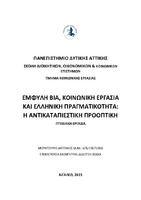| dc.contributor.advisor | Dedotsi, Sofia | |
| dc.contributor.author | Μουντούρης, Αντώνιος | |
| dc.date.accessioned | 2023-10-31T13:07:02Z | |
| dc.date.available | 2023-10-31T13:07:02Z | |
| dc.date.issued | 2023-10-18 | |
| dc.identifier.uri | https://polynoe.lib.uniwa.gr/xmlui/handle/11400/5545 | |
| dc.identifier.uri | http://dx.doi.org/10.26265/polynoe-5382 | |
| dc.description.abstract | Η παρούσα πτυχιακή εργασία πραγματεύεται το φαινόμενο της έμφυλης βίας στην Ελλάδα και πώς αυτή αντιμετωπίζεται στον χώρο της Κοινωνικής Εργασίας υπό το πρίσμα της Αντικαταπιεστικής Προσέγγισης. Αρχικά, εξετάζεται η έκταση του φαινομένου της έμφυλης βίας στο εγχώριο, ευρωπαϊκό και διεθνές γίγνεσθαι, ενώ ταυτόχρονα αποσαφηνίζονται βασικές έννοιες που χρησιμοποιούνται στην εργασία, όπως «επιζώσα», «καταπίεση», «διαθεματικότητα» κ.ά. Στο σημείο αυτό επιχειρείται μέσω μιας σύντομης ιστορικής αναδρομής της Κοινωνικής Εργασίας να καταδειχθεί πώς η Κριτική Κοινωνική Εργασία άνοιξε νέους δρόμους ερμηνείας και αντιμετώπισης του φαινομένου. Έπειτα, παρουσιάζονται σε αδρές γραμμές οι βασικές θεωρητικές προσεγγίσεις του φαινομένου της έμφυλης βίας, καθώς και το νομικό πλαίσιο (με έμφαση στο ελληνικό) και οι διεθνείς συμβάσεις που διέπουν και καθορίζουν την αντιμετώπισή του. Ιδιαίτερη μνεία γίνεται στον όρο «γυναικοκτονία» και στη χρήση του στην καθημερινή και νομική γλώσσα. Έμφαση δίνεται, επίσης, στο πώς οι διάφορες μορφές έμφυλης βίας αναπαρίστανται στην ελληνική κοινωνική πραγματικότητα, με εστίαση στον λόγο που παράγεται στα ΜΜΕ και τις τέχνες. Επιπλέον, διερευνάται το έργο και ο ρόλος των κοινωνικών λειτουργών στις υπηρεσίες που απευθύνονται σε επιζώσες έμφυλης βίας. Στη συνέχεια, γίνεται παρουσίαση των θεωρητικών καταβολών της Αντικαταπιεστικής Κοινωνικής Εργασίας και παρουσιάζονται τα βασικά θεωρητικά της μοντέλα και η σύνδεσή της με την έμφυλη βία. Με βάση αυτά προτείνεται η συνεργασία, υπό το πρίσμα της Αντικαταπιεστικής Προσέγγισης, κοινωνικών λειτουργών και επιζωσών έμφυλης βίας στα διάφορα επίπεδα δραστηριοποίησης των κοινωνικών λειτουργών, ενώ αναδεικνύονται και οι ιδιαίτερες προκλήσεις που μπορεί να προκύψουν από την συνεργασία αυτή εντός του ελληνικού περιβάλλοντος. | el |
| dc.format.extent | 128 | el |
| dc.language.iso | el | el |
| dc.publisher | Πανεπιστήμιο Δυτικής Αττικής | el |
| dc.rights | Αναφορά Δημιουργού - Μη Εμπορική Χρήση - Παρόμοια Διανομή 4.0 Διεθνές | * |
| dc.rights | Attribution-NonCommercial-NoDerivatives 4.0 Διεθνές | * |
| dc.rights.uri | http://creativecommons.org/licenses/by-nc-nd/4.0/ | * |
| dc.subject | Έμφυλη βία | el |
| dc.subject | Αντικαταπιεστική κοινωνική εργασία | el |
| dc.subject | Γυναικοκτονία | el |
| dc.subject | Διαθεματικότητα | el |
| dc.title | Έμφυλη βία, κοινωνική εργασία και ελληνική πραγματικότητα: η αντικαταπιεστική προοπτική | el |
| dc.title.alternative | Gender-based violence, social work and greek social reality: the anti-oppressive potential | el |
| dc.type | Πτυχιακή εργασία | el |
| dc.contributor.committee | Papamichail, Stella | |
| dc.contributor.committee | Σκλάβου, Κωνσταντίνα | |
| dc.contributor.faculty | Σχολή Διοικητικών, Οικονομικών & Κοινωνικών Επιστημών | el |
| dc.contributor.department | Τμήμα Κοινωνικής Εργασίας | el |
| dc.description.abstracttranslated | This thesis discusses the phenomenon of gender-based violence in Greece and how Social Work responds in the light of the Anti-Oppressive Approach. First, the extent of the phenomenon of gender-based violence in the national, European and international context is examined, while at the same time basic concepts used in the work are clarified, such as "survivor", "oppression", "intersectionality", etc. At this point, an attempt is made through a brief historical review of Social Work to show how Critical Social Work opened new ways of interpreting and dealing with the phenomenon. Then, the main theoretical approaches to the phenomenon of gender-based violence, as well as the legal framework (with an emphasis on the Greek one) and the international conventions that govern and determine its treatment, are presented in broad terms. Special mention is made of the term "femicide" and its use in everyday and legal language. Emphasis is also placed on how the various forms of gender-based violence are represented in the Greek social reality, with a focus on the discourse produced in the media and the arts. In addition, the work and role of social workers in services aimed at survivors of gender-based violence is explored. Then, the theoretical underpinnings of Anti-Oppressive Practice (AOP) are presented as well as its basic theoretical models and its connection with gender-based violence. Based on these, the collaboration of social workers and survivors of gender-based violence, in the light of the Anti-Oppressive Approach, is proposed at the various levels of activity of social workers, while the special challenges that may arise from this cooperation within the Greek environment are highlighted. | el |


